Using our NIH T32 grant and matching funds provided by UMass, we are able to award CBI traineeship funding to both domestic and foreign students.
Trainees with current CBI funding

Ruth Adafia, Trainee 2023-2025
Molecular & Cellular Biology, Stratton Lab
Elucidating the structures of CaMKII variants using cryo-EM and linking structures to their functions and regulation with the help of biochemical assays.

Sihang Chen Trainee 2023-2025
Chemical Engineering, Santore Research Group
Investigate and harness physicochemical interactions between living mammalian cells and polymer-facilitated coatings to develop an economical, robust, and non-biospecific paper-based breastmilk collection system that can easily access diverse biospecimens from women worldwide for breast cancer-related studies and epidemiologic.
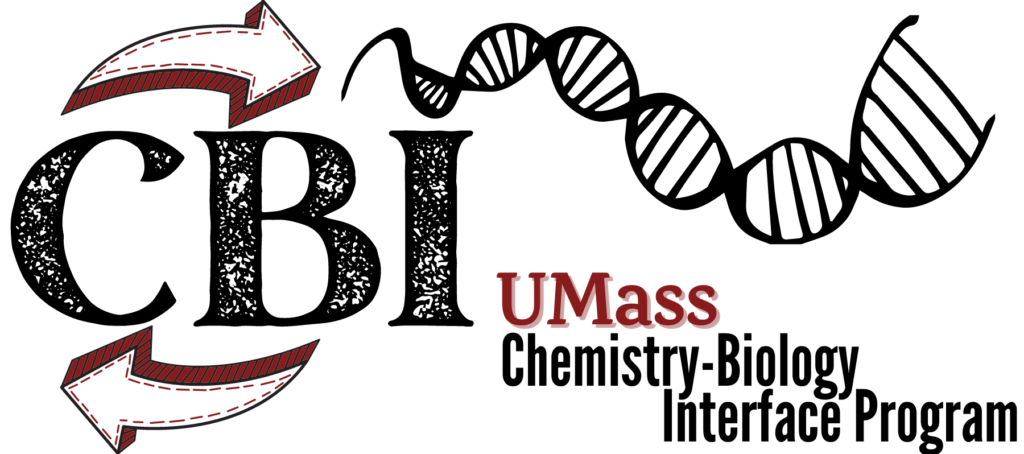
Kevin Cheung Trainee 2023-2025
Chemistry, Kaltashov Lab
We propose to connect Ion Mobility Mass Spectrometry (IM-MS) with Analytical Ultracentrifugation (AUC) and Size Exclusion Chromatography with Dynamic Light Scattering (SEC-DLS).

May Chou Trainee 2023-2025
Molecular & Cellular Biology, Rauch Lab
Investigate the age-associated N-glycosylation of LRP1 and its effect on tauopathy in Alzheimer’s disease.

Anirudh Devarajan, Trainee 2023-2025
Chemistry, Thayumanavan Group
Self-assembled nanoparticles for protein delivery, Hydrogels for protein delivery, Targeted Protein degradation.

Andrew Diog, Trainee 2023-2025
Molecular & Cellular Biology, Strieter Lab
Exploring the ways that deubiquitinase UCH37 interacts with the chromatin remodeling complex INO80 and how this interplay between chromatin biology and protein degradation can impact cellular function.

Kyla Gomard-Henshaw Trainee 2022-2024
Molecular & Cellular Biology, Muller Lab
Understanding the dynamics of post-transcriptional modifications in the context of a viral infection.

Jian Huang, Trainee 2022-2024
Chemistry, Jianhan Chen Research Group
Working in the field of computational biophysics, I am particularly interested in the structure-function relationship of biomolecules, especially ion channels. I employ computational modeling, molecular dynamics and other techniques to decipher the gating mechanisms of ion channels, ion channel-lipid interactions and regulations as well as thermosensing mechanisms of TRPV4.

Ninette Irakoze, Trainee 2022-2025
Chemical Engineering Peyton Lab
My research aims to determine how the tumor microenvironment affects the efficacy to synthetic biology approaches to treating Non-Small Cell Lung Cancer (NSCLC).

Isabella Jankowski, Trainee 2022-2024
Chemistry, Thompson Lab
Hydrogen deuterium exchange mass spectrometry on the coupling protein in E.coli chemoreceptor complexes.

Michael Moore, Trainee 2022-2024
Chemistry, Vachet Research Group
To gain insight about the protein complex structures that precede β2m amyloid formation, we are developing and applying new bioanalytical techniques. Specifically, native electrospray ionization (ESI) mass spectrometry (MS) is used to spray proteins in their folded state so that their higher order structures can be characterized by new MS methods. We aim to utilize ion mobility (IM) and collision induced unfolding (CIU) to characterize conformational isomers (conformers) of β2.

Diwakaran Palaniswamy, Trainee 2023-2025
Chemical Engineering, Perry Research Group
Development of microfluidic platforms to enable continuous production of high-purity RNA.

Janhavi Phadkar, Trainee 2022-2024
Animal Biotechnology & Biomedical Sciences, Jerry Research Group
Overcoming senescence barriers and evaluating estrogen-mediated DNA damage in human breast epithelial cell lines

Crystal Rodriguez, Trainee 2022-2024
Chemistry, Min Chen Group
Developing new nanopores for DNA/RNA and protein sequencing with high precision

Aimee Shen, Trainee 2023-2025
Chemistry, Farkas Research Group
My project involves synthesizing the retention linker and stimuli-responsive linkers to enhance cargo persistence at the cell exterior and achieve additional selectivity in the tumor microenvironment. All synthetic linkers conjugated to the surface of macrophages to verify and evaluate the surface modifications.

Andrew Shultz, Trainee 2022-2024
Chemistry, Rauch Lab
Investigating the role of microglia in tauopathies

Stefanos Stravoravdis, Trainee 2022-2024
Microbiology, The Siegrist Lab
I am working to uncover a pathway by which Mycobacterium smegmatis, a model for the lung pathogen M. tuberculosis, recycles the peptidoglycan layer of its outer protective wall and determine the utility of this pathway under different stress conditions.

Kubra Yigit, Trainee 2023-2025
Molecular & Cellular Biology, Chien Lab
In bacteria, the protein quality control machinery consists of the energy dependent AAA+ proteases, which include Lon, ClpXP, ClpAP, HslUV, and FtsH, that recognize and degrade the target proteins with the energy provided by ATP hydrolysis. In Caulobacter crescentus, the regulation of the proteolysis is crucial for the cell cycle progression and stress responses. It has been shown that lon-deficient Caulobacter cells have growth defects and are sensitive to various stresses such as DNA damage, proteotoxic stress and oxidative stress.
Trainees who have completed their CBI funding

Berent Aldikacti, Trainee 2021-2023
Molecular & Cellular Biology, Chien Research Group
Studying how systems wide fitness profiling informs on protein homeostasis

Jessica Allen, Trainee 2021-2023
Chemistry, Thompson Research Group
Solid state NMR to study protein interactions and dynamics in chemoreceptor complexes

Rashad Baker, Trainee 2021-2023
Chemistry, Hardy Research Group
Biochemistry research of key proteases to discover treatments for human disease

Ruptanu Banerjee, Trainee 2021-2023
Chemistry, Martin Research Group
Strategic Engineering Approaches towards Producing an Exceptionally Higher Yield of in vitro Transcribed mRNA
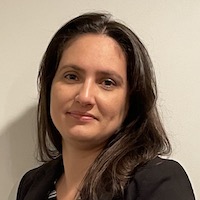
Yahaira Bermudez, Trainee 2021-2023
Microbiology, Muller Research Group
RNA structure determination and protein interactions using SHAPE-MaP in cellulo

Kevin Guay, Trainee 2021-2023
Molecular & Cellular Biology, Hebert Research Group
Understanding the selectivity and role of the UGGTs: quality control sensors and gatekeepers of the mammalian secretory pathway

Rehab Heikal, Trainee 2021-2023
Chemistry, Strieter Research Group
Development of macrocyclic peptide inhibitor for deubiquitinases using phage display technique

Cristina-Maria Hirschbiegel, Trainee 2021-2023
Chemistry, Rotello Research Group
Designing and engineering bioorthogonal nanozymes for cancer therapy
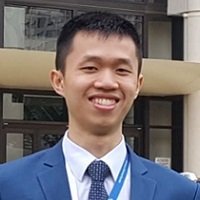
Viet Chi “Bao” Nguyen, Trainee 2021-2023
Molecular & Cellular Biology, Stratton Research Group
Elucidating molecular mechanism of the broad Ca2+ responsiveness of CaMKII
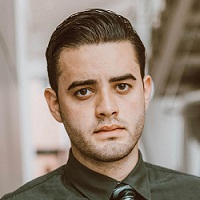
Emmanuel Rivera Iglesias, Trainee 2021-2023
Chemistry, Farkas Research Group
The effects of circadian rhythm disruption by targeting CRY, a core clock protein, using molecular tools and evaluating its association with cancer development and characteristics

Ru Zheng, Trainee 2021-2023
Chemistry, M. You Research Group
Multiplex fluorescence imaging of molecular targets in living cells with RNA-based sensors

Kiserian Jackson, Trainee 2021-2023
Molecular and Cellular Biology, Siegrist Research Group
Using metabolic labeling to track and monitor Mycobacterial growth

Brandon Barajas, Trainee 2020-2022
Chemical Engineering, Schiffman Research Group
Establishing the Mechanoselective Adhesion of Microorganisms to Biomaterials

Joshua Foster, Trainee 2020-2022
Molecular and Cellular Biology, M. Chen Research Group
Development of OmpG Nanopore Biosensors

Rebecca Gordon, Trainee 2020-2022
Molecular and Cellular Biology, Siegrist Research Group
Metabolic labeling as a discovery tool for bacterial cell wall recycling

Adrian Lorenaza, Trainee 2020-2022
Chemical Engineering, Peyton Research Group
Designing force responsive materials utilizing synthetic cryptic binding site

Erik Nordquist, Trainee 2020-2022
Chemistry, J. Chen Research Group
Predictive molecular modeling of protein function by molecular dynamics and statistical learning

Malavika Prithviraj, Trainee 2020-2022
Microbiology, Morita Research Group
Investigating the Role of Polyprenol Biosynthesis in the Maintenance and Regulation of Mycobacterial Membrane Domain

Efecan Aral, Trainee 2019-2021
Molecular and Cellular Biology, Garman Research Group
Identifying effects of Fabry disease mutations to enable personalized medicine
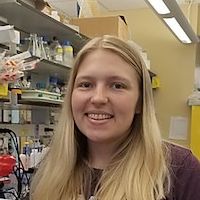
Heather Bisbee, Trainee 2019-2021
Molecular and Cellular Biology, Strieter Research Group
The Proteasomal Deubiquitinase UCH37 Promotes Degradation In Cellulo

Carey Dougan, Trainee 2019-2021
Chemical Engineering, Peyton Research Group
The Role of Cavitation in Traumatic Brain Injury

Sarthak Saha, Trainee 2019-2021
Chemical Engineering, Perry Research Group
Microfluidic platforms for high-throughput protein crystallization and drug discovery
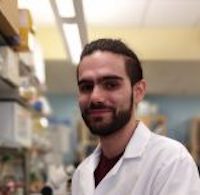
Andrew Smith, Trainee 2019-2021
Chemistry, Hardy Research Group
Studying protein interactions to identify caspase exosites

Katie Wahlbeck, Trainee 2019-2021
Chemistry, Thompson Research Group
Molecular Mechanism of Chemotaxis Receptor Control of the Kinase CheA by Solid-State NMR

Christine Battle
Molecular and Cellular Biology, Chien Research Group
Protein Destruction by Energy Dependent Proteases

Sandor Babik
Chemistry, Strieter Research Group
Interrogating Branched Ubiquitin Chains by NMR Spectroscopy and Molecular Dynamics Simulations

Nathan Canniff
Molecular and Cellular Biology, Hebert Research Group
Investigation and Biophysical Characterization of a Putative ER Chaperone or Chaperone Adapter

Mengfei Huang
Chemical Engineering, Schiffman Research Group
Synthesis of Reactive Particles for Antimicrobial Coatings
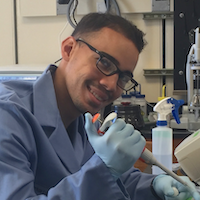
Javier Mas
Molecular and Cellular Biology, Farkas Research Group
Understanding Macrophage Polarization and Re-Education in the Context of Cancer
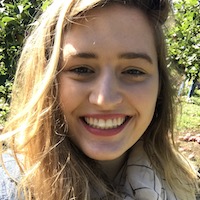
Catherine Tremblay
Chemistry, Vachet Research Group
Structural analysis of Protein Therapeutics by Hydrogen Deuterium Exchange and Covalent Labeling Mass Spectrometry

Weiyue Xin
Chemical Engineering, Santore Research Group
The impact of curvature and solid mechanics on domain patterns in molecularly thin materials

Noelle Dziedzic
Molecular and Cellular Biology, Stratton Research Group
Molecular mechanism of Ca2+ calmodulin dependent protein kinase II (CaMKII) in neuronal signaling during long-term memory formation

David Luther
Chemistry, Rotello Research Group
CRISPR/Cas9 Technology as a Therapeutic Approach to Cystic Fibrosis

Samar Mahmoud
Molecular and Cellular Biology, Chien Research Group
Discovery of small molecule and genetic interactions with the Lon protease

Emily Melzer
Microbiology, Siegrist Research Group
Synthesis and remodeling of the cell envelope in Mycobacteria

Ishankumar Soni
Chemistry, Hardy Research Group
Nucleotide Regulation of Procaspase-6

Qikun Yu
Chemistry, You Research Group
Developing RNA sensors for antimicrobial agents

Ben Adams
Molecular and Cellular Biology, Hebert Research Group
The Role of ERQC in the Biology of the Cells
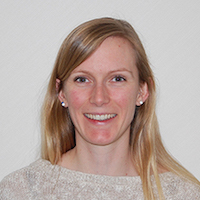
Coralie Backlund
Tew Research Group
HIV Tat
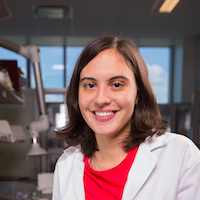
Elizabeth Brooks
Peyton Research Group
Stem Cell Induced Drug Resistance in Cancer Cells

Derrick Deming
Garman Research Group
Structure of Acid Alpha-Glucosidase

Jiale Du
Chemistry, Strieter Research Group
Discovery of Small Molecule Inhibitors of Deubiquitinases Through High Throughput Polirization Screening

Kingshuk Dutta
Chemistry, Thayumanavan Research Group
Self-Immolative Redox-Sensitive Strategy for Protein Delivery

Yingying Geng
Molecular and Cellular Biology, Rotello Research Group
Nanosensor-Based Phenotypic Screening for Precision Therapy of Breast Cancer Stem Cells

Hui-Hsien Lin
Chemistry, Farkas Research Group
Correlation of Circadian Rhythm Disruption and Cancer Progression in Mammalian Cells

Bach Pham
Chemistry, M. Chen Research Group
Single Molecule Study of Enzymes Using an OmpG Nanopore

Molly Shave
Santore Research Group
Microparticles as Models for Biological Cells

Kristen Sikora
Chemistry, Vachet Research Group
Interactions between Gold Nanoparticles (AuNPs) and Biomolecules
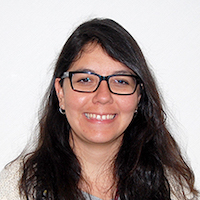
Ana Torres Ocampo
Molecular and Cellular Biology, Stratton Research Group
CaMKII Subunit Exchange in Long-Term Potentiation

Rilee Zeinert
Chien Research Group
How the Lon Protease Regulates Adaptation to Environmental Stress